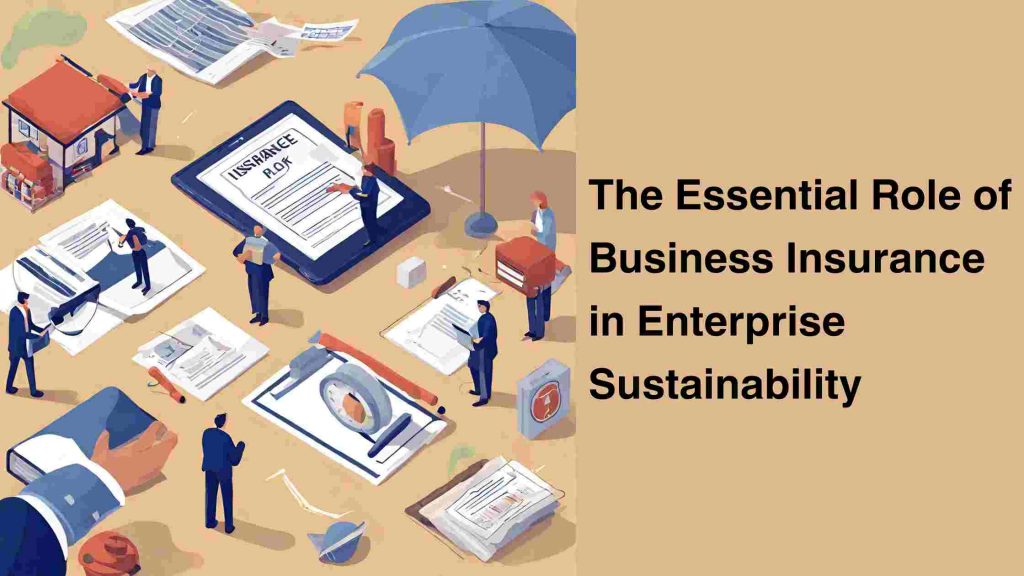Introduction
Choosing the appropriate insurance coverage is one of the most important choices you will make while launching or operating a business insurance. As a safety net, business insurance protects you against a variety of hazards that can jeopardize your company’s continued existence. Business insurance can reduce risks such as property damage, employee injuries, lawsuits, and cyberattacks and aid in your company’s speedy recovery in the event of an emergency.
The definition of business insurance, its several forms, its necessity, how to identify the coverage your company requires, and how to choose the best insurance plan for your company will all be covered in this article.

What is Business Insurance?
A business insurance coverage helps shield your company from possible losses brought on by a variety of hazards and unanticipated circumstances. Property damage, liability, worker injuries, and other losses that can have a detrimental effect on the company’s financial situation are usually covered.
For the majority of businesses, full coverage will require a mix of various insurance plans. Depending on the industry, size, and unique risk characteristics of each company, business insurance can be customized.
Why is Business Insurance Necessary?
- Protection from Financial Loss: Without insurance, a small business could suffer a catastrophic financial loss due to accidents, property damage, or legal battles. In the event of an unanticipated circumstance, business insurance helps reduce the danger of losing everything.
- Credibility and Trust: Your company’s credibility can also be improved by having business insurance. Knowing that your firm is insured may reassure clients and partners that you are committed to professionalism and risk management.
- Peace of Mind: Business owners may rest easy knowing that their assets, personnel, and investments are safeguarded when they have the proper coverage. It frees you from worrying about any hazards so you can concentrate on expanding your company.
- Recruiting and Retaining Staff: Providing health insurance and workers’ compensation benefits might help your company draw in top talent. Benefits that safeguard workers in the event of illness or accident increase the likelihood that they will remain with a company.
Types of Business Insurance
Business insurance comes in a variety of forms, each intended to address particular facets of company operations. How many employees you have, the dangers your company confronts, and the nature of your organization will all affect the kinds of insurance you require.
The most popular kinds of business insurance are as follows:
1. General Liability Insurance
One of the most basic forms of business insurance is general liability insurance. It protects your company in the event that it is held accountable for harm or property damage to other people. Usually covered by this kind of insurance are:
- Physical harm
- Damage to property
- Injury advertising
- Defense expenditures and legal fees
For instance, general liability insurance will pay for medical expenses and any legal fees if a customer slips and falls in your store and chooses to file a lawsuit.
2. Property Insurance
Damage to your company’s property brought on by natural disasters, theft, vandalism, or fire is covered by property insurance. Usually, it includes:
- Office buildings
- Tools
- Stock
- Sets of furniture
- Indications
For companies that depend on tangible assets or machinery, property insurance might be particularly crucial. You want to be sure that your company can bounce back fast in the event of a tragedy.

3. Workers’ Compensation Insurance
When an employee is hurt on the job or gets sick, workers’ compensation insurance pays for their medical bills and lost income. If an employee files a lawsuit against the company for their damage, it may also pay for legal costs. Businesses with a specific number of employees are required by law to provide workers’ compensation in several areas.
This insurance is particularly crucial for companies that handle hazardous or physical labor-intensive operations. Without it, your company could have to pay for substantial employee compensation and medical expenses out of pocket.
4. Commercial Auto Insurance
Commercial auto insurance is crucial if your company employs cars for any kind of business-related activity, including moving personnel or commodities. Accidents and damage sustained when using commercial vehicles are covered by this insurance. It could include:
- Costs of auto repairs or replacements
- Medical costs for accident-related injuries
- Responsibility for harm or property loss brought on by a company vehicle
Commercial auto insurance is necessary if your company has automobiles, and it is still advised to have it even if you use your own car for work.
5. Professional Liability Insurance
Professional liability insurance, sometimes referred to as errors and omissions (E&O) insurance, safeguards companies that offer expert services, counsel, or consultancy. It includes:
- Legal costs
- Defense costs
- Allegations of carelessness, errors, or non-fulfillment of services
For instance, professional liability insurance would pay for the costs of defending against a lawsuit brought by a client against a consultant for a mistake that resulted in financial loss.
6. Product Liability Insurance
Product liability insurance is crucial if your company produces or sells goods. It offers protection in the event that a product you sell injures or damages someone or property. This may consist of:
- Products with flaws that cause harm
- Product mislabeling or misrepresentation
- Violating guarantees or not delivering goods as agreed
Businesses engaged in product development, manufacture, or sales should pay particular attention to this insurance. Without it, there may be serious compensation claims against your business.
7. Cyber Liability Insurance
Businesses are more vulnerable to cyberattacks as they depend more and more on digital platforms. In the case of a hacking incident, cyberattack, or data breach, your company is protected by cyber liability insurance. Usually covered by this insurance are:
- The price of informing those who are impacted
- Legal charges
- Costs of data recovery and system restoration
- Losses due to business interruption caused by the cyber event
losses as a result of the cyber event’s disruption of business
8. Business Interruption Insurance
The loss of revenue incurred by a firm following a covered incident that interferes with its operations is covered by business interruption insurance. This may consist of:
- Property damage
- Natural catastrophes
- Mishaps that stop regular company operations
For instance, business interruption insurance might pay for lost profits while you rebuild and repair your storefront in the event of a fire.
9. Directors and Officers Insurance (D&O)
Directors and officers of the company are protected by D&O insurance in the event that they are sued for acts they took while performing their official duties. It can pay for damages, settlements, and legal defense expenses for claims pertaining to:
- The company’s poor management
- Violating fiduciary obligations
- Violations of employment procedures
Smaller companies with a board of directors or officers should also think about D&O insurance, even though major organizations typically have it.
10. Umbrella Insurance
Beyond what your other company insurance policies cover, umbrella insurance offers extra protection. It starts when your general liability, vehicle liability, or other insurance’ liability limits are surpassed. Businesses that are more likely to be the target of significant lawsuits may find this very helpful.

How to Determine Your Business Insurance Needs
A number of variables will determine your company’s insurance requirements:
- Industry: The dangers associated with various industries vary. Compared to a computer startup, a construction company will require greater coverage for property damage and worker injuries.
- Size of Your Company: Bigger companies with more assets and staff can require more comprehensive coverage than smaller companies.
- Location: Due to regional weather patterns, crime rates, or other considerations, some regions may have particular needs or higher dangers.
- Assets: More comprehensive property and liability coverage may be required for companies with valuable assets, such as machinery, stock, and intellectual property.
- Employee Count: Workers’ compensation and other employee-related insurance coverage should be taken into consideration if your company employs people.
Choosing the Right Insurance Provider
- To make sure you’re obtaining the finest coverage for your company needs, it’s critical to examine various policies and insurance providers before selecting one. Take into account these elements:
- Reputation: Seek out an insurance company with a strong history and satisfied clients.
- Policy Options: Pick an insurance company that provides the kinds of coverage you require and permits customization to meet the particular requirements of your company.
- Customer care: Verify that the supplier provides dependable customer care and assistance when required.
- Cost: Although price is a factor, don’t forgo high-quality coverage in favor of a cheaper premium. Make sure the coverage offered is thorough and suitable for your company.
Conclusion
A vital part of risk management and safeguarding your company against any losses is business insurance. Working with a reputable insurance provider, evaluating your unique needs, and being aware of the many forms of business insurance will guarantee that your company is protected against a variety of potential risks. You may protect your company from monetary losses and support its growth in the face of uncertainty by making the appropriate insurance investment.
Regardless of your company’s size, taking the time to assess your insurance requirements and obtain the appropriate coverage can provide you peace of mind and enable you to concentrate on confidently expanding your business.
